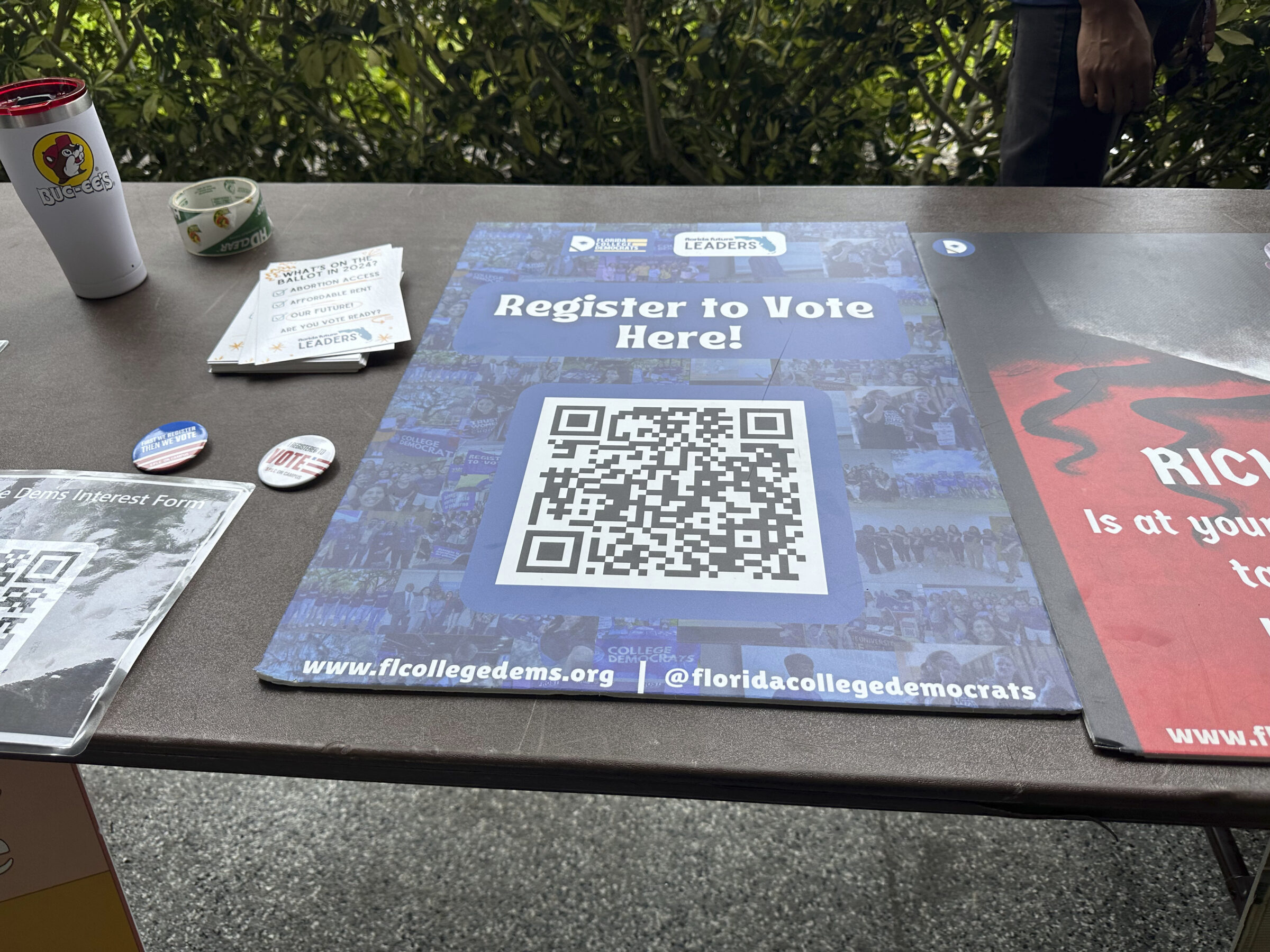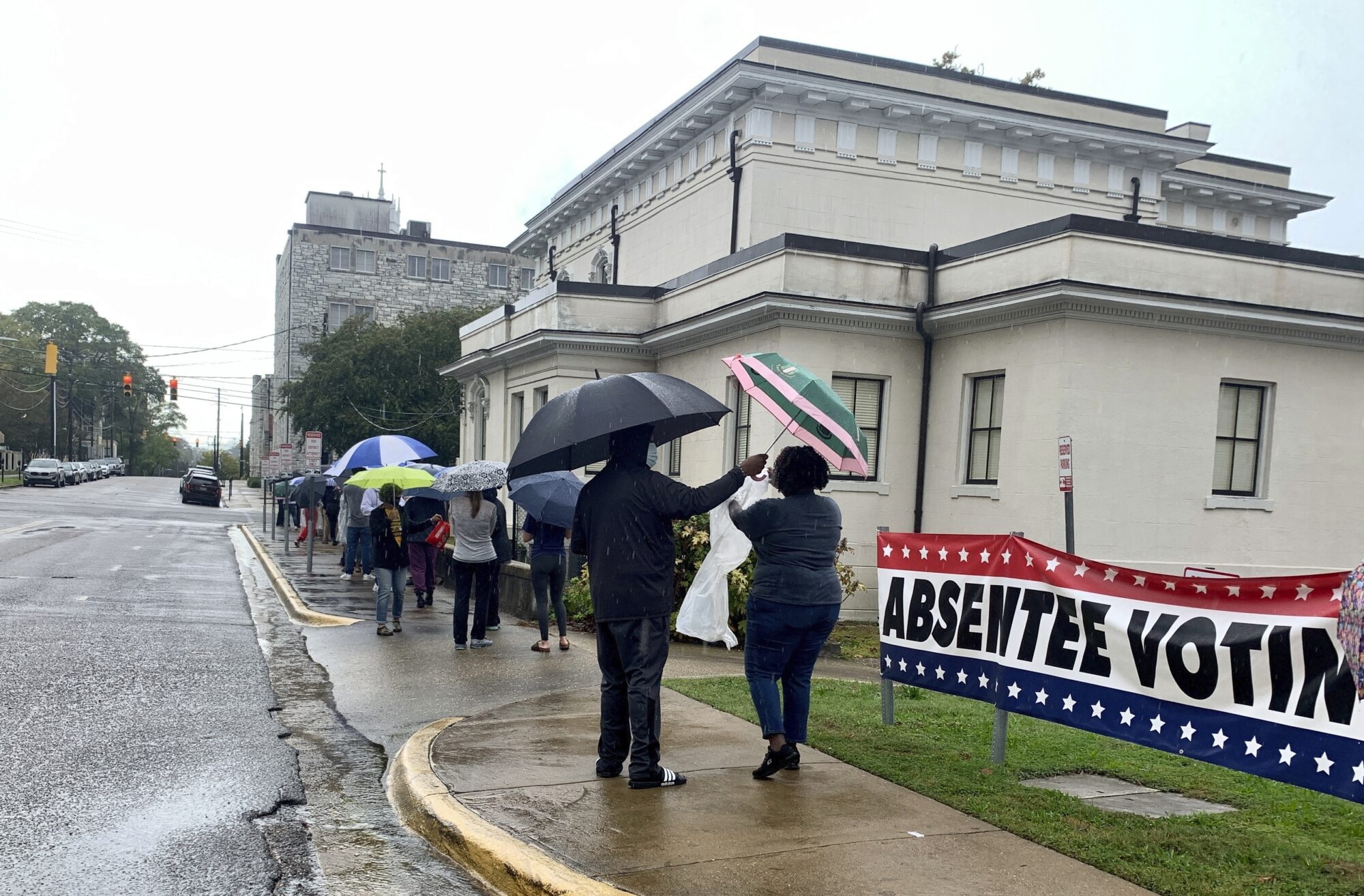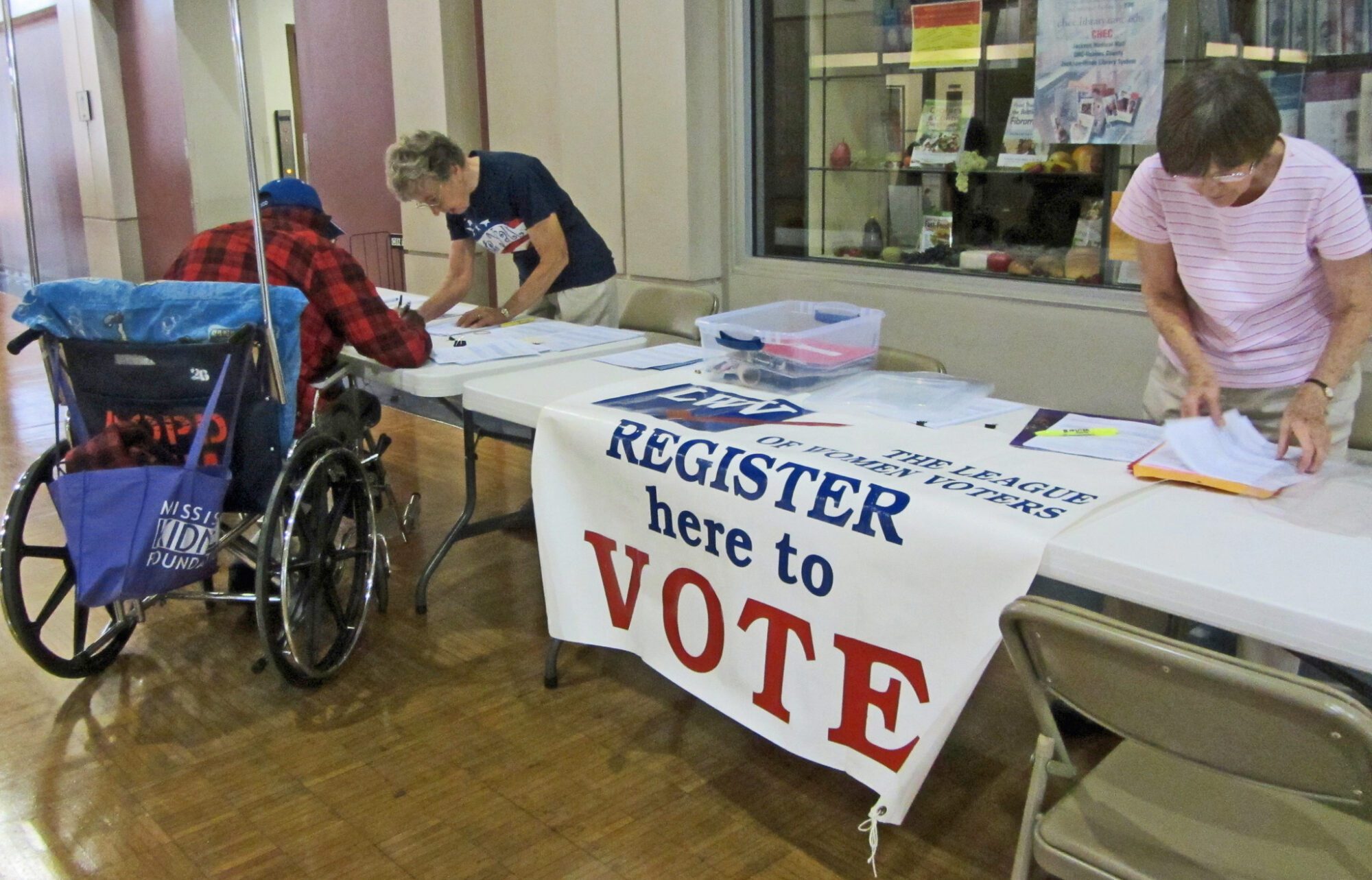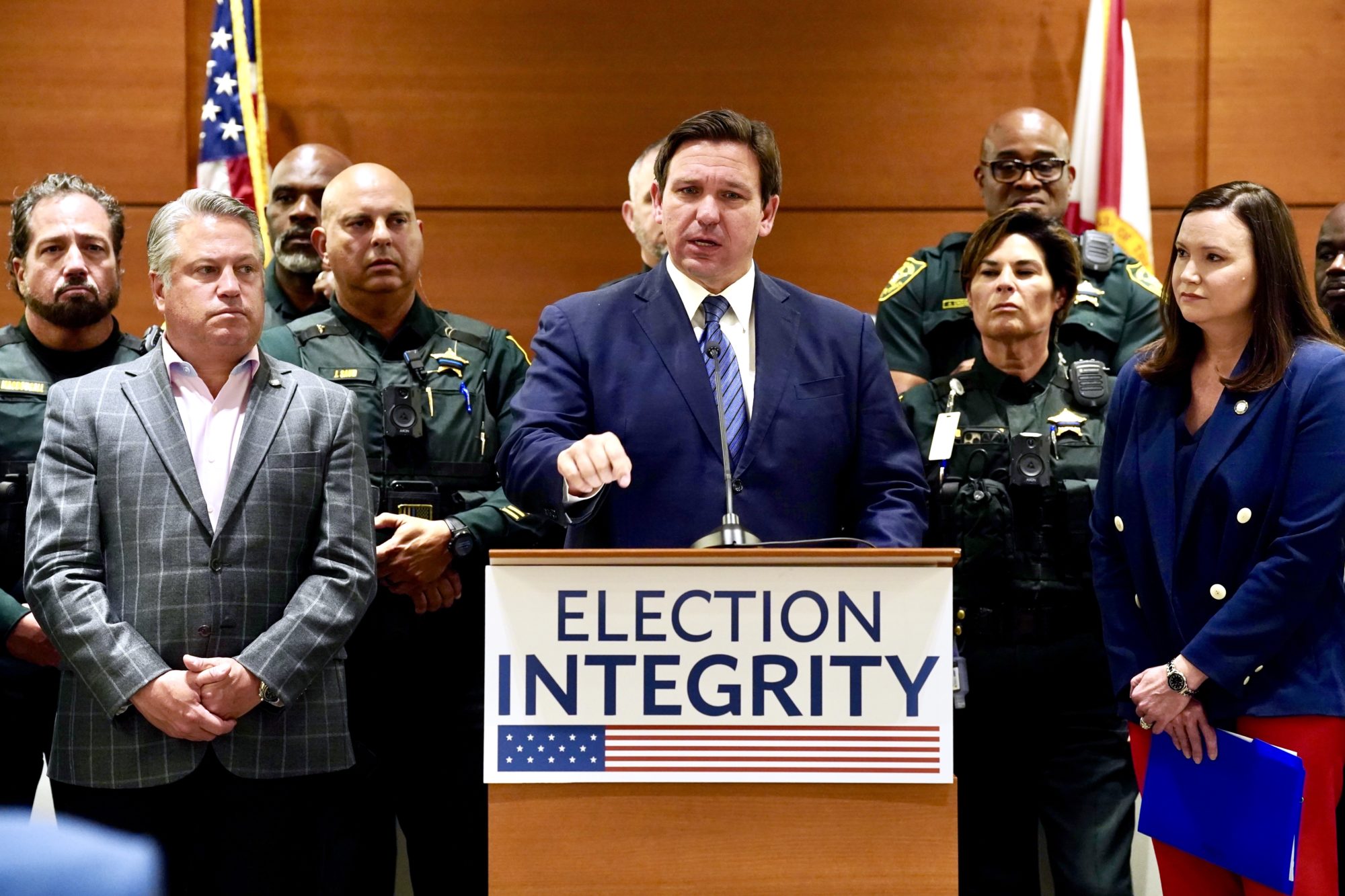Florida Law Strikes “Deathblow” to Outside Groups Trying to Register New Voters
The GOP imposed new restrictions on voter registration organizations, and threatened them with steep fines for violations. Now these groups are scrambling to adapt.
| September 20, 2024


With the 2024 presidential election around the corner, third-party voter registration organizations around the country are hitting the streets; showing up at state fairs and community events, clipboards in hand, to ensure eligible voters are registered and ready for November 5. But in one swing state—Florida—these groups have had to completely rethink their voter engagement work in the face of restrictive legislation.
In April 2023, the Florida legislature passed Senate Bill 7050, a law imposing a slew of new regulations on the activities of third-party voter registration organizations (or “3PVROs” as they are referred to by Florida government officials). Under the law, these groups must re-register with the state before each election cycle in order to collect voter registration forms, and they have a shorter time frame to return voter registration forms to the county supervisor of elections; just 10 days, down from 14, with a $50 penalty per late day, up to $2,500 per application. SB 7050 also requires that applicants are provided with receipts that contain the name of the volunteer or staff member who registered them.
The law also prohibits individuals previously convicted of felonies from “handling or collecting” voter registration applications, and imposes $50,000 fines for each volunteer violating these standards. This effectively requires 3PVROs to conduct background checks. The ceiling for aggregate fines has also increased: groups can now face up to $250,000 in fines each year, quintupling from the previous figure of $50,000.
The effects of SB 7050 have been felt around the state. In a state that already sees lower voter registration rates across the board, particularly for Black, Hispanic, Asian, and other communities of color outside organizations have long stepped in to fill a void left by state actors. But that work is now stalling. When the law came into effect, Poder Latinx, an organization promoting civic engagement in Latinx communities, paused their programs as there were “no clear guidelines on how to move forward.” Carolina Wassmer, Poder Latinx’s Florida State Director, mentioned that the organization had to work closely with their legal counsel to understand the law’s implications and ways to ensure compliance before resuming voter outreach.
Advocates see SB 7050 as the latest in a wave of voter suppression laws to come out of the state legislature. It was preceded by other laws such as SB 90 and SB 524 which restricted vote-by-mail and increased fines on these groups, respectively.
“7050 was sort of the deathblow to third-party voter registration,” said Genesis Robinson, interim executive director of Equal Ground Education Fund and Action Fund, a Black-led voter rights organization. “It was really a compounding effect with other voter suppression bills that had passed in previous legislative sessions.”
The requirement of re-registering with the state each election cycle, combined with the possibility of burdensome fines, has “radically changed” how the League of Women Voters of Florida registers voters. “We come prepared with voter registration applications, but we just no longer take them away and turn them in,” Cecile Scoon, co-president of the Florida League, told Bolts.
Rather than collecting forms and submitting on behalf of voters, League volunteers now provide people with assistance with filling out the form as well as stamps and envelopes that the organization has purchased through fundraising so that applicants can mail the forms on their own. However,this new method only works if individual applicants take the initiative to mail their own form—which is more difficult to guarantee than when 3PVROs collected and submitted on their behalf.
“The whole process of explaining to mail it and everything like that is slower,” Scoon said. Before, volunteers could walk through crowds at Fourth of July parades and community events, handing out and collecting voter registration forms, but now, they are “more stationary at a table.”
D’Bria Bradshaw, Florida state coordinator of the Campus Vote Project, which supports universities in getting students to register, has had to try other novel strategies to avoid any possibility of fines. “The best way to get students registered to vote:direct them to the QR code, direct them to the website, and walk them through registering to vote,” said Bradshaw.
By scanning QR codes, students can access voter registration forms on their electronic devices and fill it out on their own (hopefully right there on the spot) without outside assistance.
Other organizations have also shifted to a digital strategy. Equal Ground has invested in tablets and electronic devices to bring to community events, where organizers walk applicants through the process of registration. “Because of 7050 and the implications with respect to fines and fees and potential jail time, we thought it necessary to mitigate risk as much as possible. And so we have foregone doing paper voter registration applications,” said Robinson. “That has a tremendous impact on the communities that we serve.” Robinson points out that voters of color are five times more likely to be registered to vote by a third-party voter registration organizer.
Recognizing the suppressive nature of SB 7050, several groups challenged the law in federal court shortly after its passage. Abha Khanna of Elias Law Group is the lead attorney on the case Florida NAACP v. Byrd, which challenges three provisions of the law: the personal information retention ban, a previous section that originally prohibited noncitizens from handling voter registration applications as well as people with felony convictions, and the increased fines for late applications or technical errors. The former two provisions are not currently in effect: the first was preliminarily enjoined due to a lack of clarity on what constitutes personal information, while the second was found unconstitutional and permanently enjoined.
The third provision, however, remains in effect and is hampering the functioning of voter organizations.
“A single late day can really have serious consequences for many of these non-profit organizations on shoestring budgets,” said Khanna. “The result of all of these [provisions] individually and together is to really try to squeeze out and crush third-party voter registration organizations and limit their opportunities and their abilities to register.”
The law has also left voting organizations struggling to find enough willing and able volunteers. When the noncitizen provision was in effect, organizations like Poder Latinx that serve immigrant communities faced shrinking teams as some volunteers were not citizens. Though that provision has been struck down, the provision forbidding volunteers who have previously been convicted of a felony still burdens these groups, as they must conduct background checks to avoid the possibility of facing steep fines, with the maximum penalties of $250,000 per year often exceeding organizations’ annual budgets.
Threats of fines and criminal penalties without clear guidelines on what is required has produced a climate of fear surrounding voter registration work. Robinson of Equal Ground mentioned that many of the organization’s long-time paid canvassers have “walked away from that space voluntarily because their risk is just too great.” And according to Scoon, some League volunteers—particularly older women—are apprehensive about continuing to register voters as they feel that handing out their full names on receipts could endanger their physical safety in a tense political environment.
SB 7050 has also made it more difficult to track how many voters they have registered. Prior to the law, voting organizations had special registration numbers that were added to the forms they collected so that government data would reflect how many voters were registered by each organization. Now that many groups have stopped collecting forms, there is no way to know if voters who received paper forms actually completed and submitted them.
Though procuring an exact number is impossible, Scoon estimated that voter registration numbers have gone down “at least 30 percent” for the League. Wassmer mentioned that Poder Latinx has achieved less than 50 percent of its goal to reach 10,000 voters since the law’s passage. Robinson also described a “deep decline” in the number of voters Equal Ground has been able to reach, as well as an overall decrease in the registration of Black voters across the state.
In 2020, the most recent presidential election year, voting organizations in Florida had registered 458,197 voters. In 2024, they have registered only 13,521 Floridians as of August 31.
This drop is raising alarms about inequalities in voter access. Twenty-four states and the District of Columbia have implemented automatic voter registration in recent years, and some states have explored other innovative ways to reach groups of voters who don’t have contact with typical registration channels such as a DMV. Michigan last year became the first place to automatically register people to vote as they leave prison. And Colorado is working with Native leaders to register voters through tribal enrollment rolls. Several states have tried to enact automatic voter registration through Medicaid, though the reform is being held up at the federal level.
Where these efforts are still fledgling, outside groups are standing in the gap to reach more voters by promoting voter registration and reducing disparities in civic engagement. “The voters that they tend to reach, that the other services—government services—don’t usually reach, tend to be Black and brown and poor voters,” Khanna said.
As of November 2022, Florida had the fifth lowest percentage of registered voters as a share of the eligible population. It has no automatic voter registration, nor any state-sponsored mechanisms to promote higher registration numbers, and increasing burdens and punitive measures on outside organizations that threaten to reduce overall voter registration and turnout and widen racial gaps ahead of the 2024 election.
Yet, voting advocates question the need for such extreme restrictions. “It’s not that there’s a rampant issue of these 3PVROs sitting on applications or behaving in a way that was un-diligent when it came to submitting voter registration applications,” Khanna said.
In fact, the opposite seems to be true for many organizations, such as the League of Women Voters of Florida, which had robust training programs requiring volunteers to pass a quiz before registering voters, and pairing newer volunteers with more experienced ones to ensure guidelines were being followed.
“If they had problems, just deal with the people you have problems with. The League has never had a problem. The League has never been written out, warned, or anything,” Scoon said.
Teresa Cornacchione is the civic engagement coordinator at the University of Florida’s Bob Graham Center for Public Service, an organization that is certified to register students to vote. A major challenge emerged for the Bob Graham Center in 2021, when SB 90 was passed by the Florida legislature, requiring that such groups submit voter registration forms to the supervisor of elections in the county in which the applicant resides. The University of Florida is comprised of students from all across the state, so submitting forms to each of Florida’s 67 counties increased the time and cost associated with voter registration. SB 7050’s narrowing of the time frame to return forms, combined with this 2021 requirement, has made the voter registration process more difficult for staff and volunteers at UF.
Yet, despite these barriers, voting organizations have not given up hope. According to Cornacchione, staff and students at the University of Florida are ready “to work even harder” to register voters. “I don’t think the 3PVRO stuff has really deterred these students from being engaged,” she said. The Bob Graham Center’s Gators Vote initiative visits first-year classes and registers students to vote with the permission of the instructor.
In April, Equal Ground began a statewide tour to educate voters on new registration requirements, the implications of voter suppression laws, and issues that will be on the ballot. Similarly, the League is hosting forums, litigating, participating in bus tours, preparing voter guides, and tabling at colleges, churches, and community events. The organization is also mobilizing voters around abortion rights, which is on the 2024 ballot as Amendment 4.
“There’s a lot of mobilization that you can do that is not directly attached to voter registration,” Scoon said.
Sign up and stay up-to-date
Support us
Bolts is a non-profit newsroom that relies on donations, and it takes resources to produce this work. If you appreciate our value, become a monthly donor or make a contribution.








